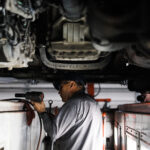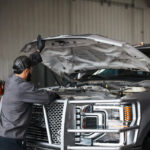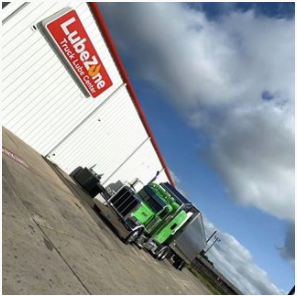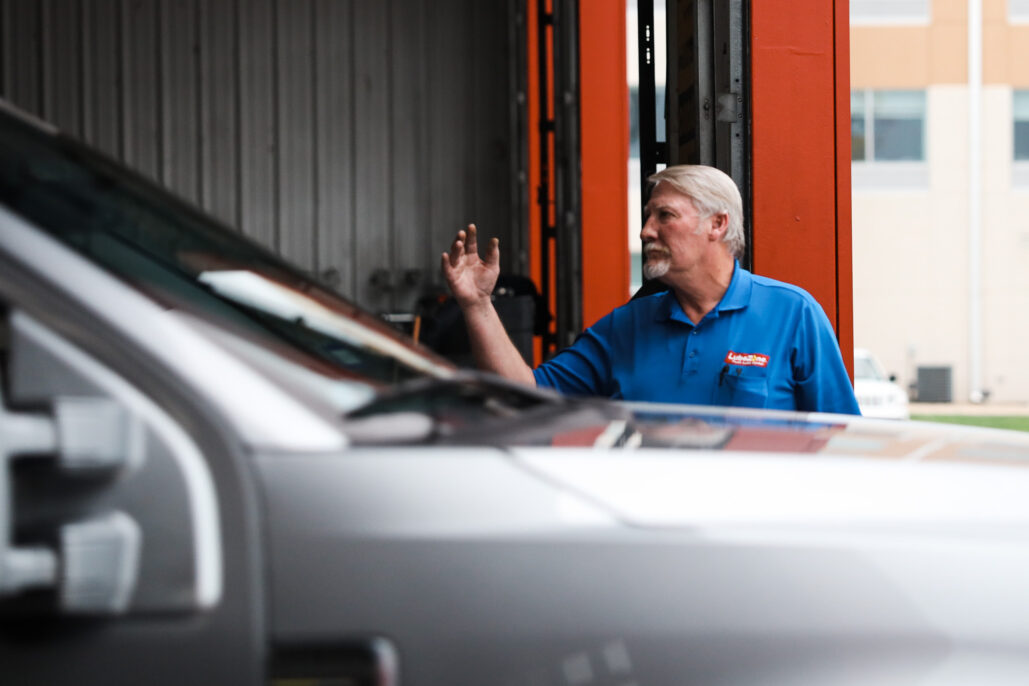
The Real Cost of Skipping Preventive Maintenance
September 23, 2025
Emergency Maintenance Hacks Every Long-Haul Trucker Should Know
October 8, 2025Recently updated on October 23rd, 2025
Fuel is a major expense in the trucking industry, so making sure that you are implementing strategies and techniques to stay efficient is good for your bottom line and the environment alike. There are a lot of different factors that go into achieving great fuel economy, and the first step towards better fuel economy is understanding these factors so you can put them into practice.
We put together a comprehensive guide that goes over the essentials of efficiency, ranging from topics like routine maintenance to fuel economy-focused driving habits, as well as things like fuel quality, tech innovations, and what the future may hold in terms of efficiency. We’re pretty sure that whether you are brand new to the road or a seasoned driver, you’ll find something in these strategies that will be new to you.
As a trucker, it’s important to know who to partner with to keep your rig running as best as possible. Check out LubeZone’s semi truck maintenance services to connect with a team of experts and keep your truck in great shape with our many different services at convenient locations across the country.
Let’s get right into it.
Understanding Diesel Engines and Fuel Economy
Diesel engines rely on compression ignition rather than spark plugs; the air‑fuel mixture is compressed until it self‑ignites. This allows diesel engines to operate at higher compression ratios and achieve better thermal efficiency than gasoline engines. The higher efficiency is one reason trucking companies favor diesel for hauling heavy loads.
Factors that Impact Fuel Efficiency
These are just a few of the nearly infinite factors that ultimately influence the fuel economy of a diesel engine:
- Engine Design and Condition:Diesel engines burn fuel more completely at higher compression, but efficiency declines if the fuel system is dirty or the engine is poorly maintained
- Vehicle Weight and Aerodynamics : This might come as a surprise, but an 18-wheeler is a lot heavier than a VW Golf, meaning that there is a lot more energy necessary to get it moving and keep it moving — especially while loaded down with cargo. Drag is also a major contributor; at highway speeds an 18‑wheeler may use up to 50 % of its fuel to overcome aerodynamic drag.
- Driving Habits: Frequent stops and starts, which are common for city deliveries, as well as excessive idling and aggressive driving will all lead to lower MPG. Some of these are unavoidable, like starting and stopping at lights and intersections, but the way you drive directly impacts your fuel usage.
- Maintenance Routines: A well-maintained truck will have better fuel efficiency. Staying on top of things like routine oil changes, air filter replacements, proper tire inflation, and many other common maintenance best practices will help keep your truck running efficiently and will avoid costly repairs caused by deferred maintenance.
These are just a few of the many different factors and best practices that are worth considering in your routing. Each of these factors, when considered and treated appropriately, will result in lower operating cost, better fuel economy, and a reduced environmental footprint — all positives for the trucking industry and for your wallet.
Comprehensive Maintenance Checklist for Better Mileage
Regular maintenance is the foundation of improved fuel economy — and a long-lasting truck. Use this maintenance checklist to keep your engine running efficiently:
Regular oil checks and changes: Oil is the engine’s lifeblood. Change it at the intervals recommended by the manufacturer to ensure proper lubrication and maximum efficiency. Choose oil that matches the engine’s design and age – using the wrong oil can decrease efficiency and cause excess wear.
Fuel‑system care: Replace fuel filters frequently. A dirty filter restricts fuel flow and can cause clogging or poor combustion, wasting diesel and reducing power.
Air‑intake system maintenance: Diesel engines need clean air for efficient combustion. Dirty or clogged air filters (common in dusty environments) reduce airflow and force the engine to work harder. Follow the manufacturer’s replacement schedule and inspect filters regularly.
Cooling‑system upkeep: High compression generates a lot of heat. Always maintain the proper coolant level and inspect the radiator for damage or leaks. An overheating engine not only wastes fuel but can lead to a roadside emergency.
Emission‑system checks: Modern diesel trucks use complex emission controls. Regular inspections keep emissions low, protect the environment and ensure compliance with regulation.
Battery and electrical system maintenance: A strong electrical system is necessary for starting and operating a diesel. Check battery terminals for corrosion, confirm mounts are secure and verify that the charging system is operating correctly.
Inspect belts and hoses: Visual checks for wear, cracks or fraying help you replace parts before they fail. Worn belts or hoses can reduce efficiency or cause unexpected breakdowns.
Adhering to this maintenance schedule not only extends the life of your truck but directly improves fuel economy. For tasks beyond your comfort level, such as emission‑system repairs or major diagnostics, don’t hesitate to consult professional technicians.
Driving Smarter: Techniques for Fuel Savings
The most diligent maintenance in the world is only one piece of the fuel economy puzzle, and your driving behavior is another that is equally, if not more, important. By using efficient driving techniques, you can reduce your fuel consumption and emissions while saving money and often avoiding wear and tear on your truck. Here are a few tried and true techniques for more efficient driving:
Avoid unnecessary idling: Every hour of idling consumes about a gallon of fuel. Turn off the engine during long stops and use auxiliary power units or idle‑reduction technologies when practical.
Maintain steady speeds: Cruise control can reduce fuel consumption by up to 6 % because it eliminates the small fluctuations in speed that waste fuel. Maintaining a moderate, consistent speed also minimizes aerodynamic drag.
Smooth acceleration and deceleration: Rapid acceleration burns extra fuel. Gradually build speed and anticipate stops so you can brake gently and use momentum efficiently.
Use trucks strategically: If you manage a fleet, spread the miles evenly across your trucks. Uneven usage causes some rigs to accumulate more wear, leading to higher repair costs; balanced use makes it easier to stay on top of regular maintenance.
Train and incentivize drivers: Driving style matters. Hiring drivers who prioritize fuel efficiency and rewarding them for good practices encourages habits that save fuel.
Plan routes thoughtfully: When possible, choose routes or times that avoid heavy traffic. Stop‑and‑go driving and congestion both reduce fuel economy.
Use climate control wisely: Air conditioning draws power from the engine, so use it judiciously at lower speeds. Ventilation or open windows may suffice in mild weather.
These are just a few of the many different techniques that you can incorporate into your daily routine to improve your diesel engine’s economy, reduce operational costs, and lower carbon emissions.
Enhancing Efficiency with Quality Fuel and Additives
You can change your driving habits and keep up with your maintenance, but there is even more you can do to improve your fuel economy while taking great care of your truck. High-quality fuel and the right additives will assist your engine with better combustion while reducing wear and tear and emissions and extending the life of your engine and it’s constituent components.
Diesel Fuel Additives
Diesel fuel additives are beneficial compounds that will enhance the properties of diesel fuel in a few ways:
- Improved Combustion: Additives will increase the cetane numbers in your diesel fuel, which will in turn lead to more complete combustion.
- Injector Cleaning: Your diesel fuel injectors can get clogged and gunked up over time, which will reduce fuel efficiency by not distributing the fuel evenly across the cylinders. An additive can clear the nozzles so you get a better spray pattern and better combustion as a result.
- Fuel Stability: This isn’t typically a problem for truckers, but an additive can stabilize your fuel and prevent sedimentation or oxidation, both of which will reduce the fuel’s effectiveness over time.
- Reduced Emissions: Some additives can help reduce your emissions, which will make your vehicle more environmentally friendly. This is a nice bonus, even if it doesn’t directly correlate to improved fuel efficiency.
High-Quality Diesel Fuel
Good fuel will have a significant impact on your truck’s performance and fuel efficiency. While you don’t always have much of a choice, it’s a good idea to use reputable fueling stations and opt for premium diesel if it’s an option. Check the cetane numbers of the fuel if you can, and ask about whether or not there are additives in the fuel, like detergents, enhancers, or anti-gel agents.
Using high-quality diesel fuel will lead to benefits like:
- Better combustion efficiency
- Reduced engine deposits and sediment
- Enhanced lubrication
- Lower emissions
- Improved cold-weather performance
It isn’t always an option to be picky with your fuel, but between opting for high-quailty diesel when possible and using additives with some regularity you may find that your truck is running better than ever.
Technological Innovations in Fuel Management
Technological advancement is revolutionizing fuel management in the trucking industry in ways that address fuel economy, cost efficiency, and environmental sustainability all at once. Here are a few:
Advanced Fuel Monitoring Systems
- Telematics and Internet of Things (IoT) Integrations: Telematics integrated with IoT technology provides real-time data on fuel usage, vehicle performance, and driving behavior. With AI enhancements, fleet managers and drivers can get instant updates and suggestions on changes that can improve performance and efficiency.
- Fuel Sensors: Advanced fuel sensors can monitor fuel levels and usage and alert drivers and fleet managers about potential issues.
- Automated Reporting: With automated reports generated with fuel management systems, drivers and fleet managers can review a truck’s performance with long-term aggregate data to identify trends on fuel usage and costs. These are helpful in forecasting, budgeting, and identifying areas that can be improved with fuel-efficient practices.
Engine Control Technology
A lot of engine control technology is emerging, as well. Most of these developments are found in newer models:
- Electronic Control Units (ECUs): Modern diesel engines have ECUs that function as central hubs for things like fuel injection timing, combustion efficiency, fuel distribution, and more. In some models, they can be programmed to prioritize things like power vs. efficiency, different driving conditions, and more.
- Variable Geometry Turbochargers (VGTs): A VGT will make on-the-fly adjustments of air intake based on your engine load, speed, and more, and will improve your fuel efficiency as a result. This type of technology keeps your engine running efficiently in a wide range of conditions and demands.
Troubleshooting Common Diesel Engine Issues
Even the most meticulously cared-for diesel engine can have issues, so it’s important that you stay attuned to what your engine is telling you. Here are a few common issues to look out for:
Hard Starting
If your engine is cranking but it isn’t starting, or you find that you are cranking it for much longer than normal, you may be dealing with a few different issues such as a weak battery or batteries, problems with your fuel delivery system, or a failed glow plug. Test your electrical system and batteries, replace your fuel filters, bleed your lines, and check on your glow plugs for a start.
Smoky Exhaust
Your exhaust system will always put out some smoke, but thick smoke might be telling you there is a problem. Black smoke might indicate that you aren’t getting full combustion, while blue smoke typically means that you are burning oil. White smoke might be an issue with unburned fuel or could be a cooling problem. Depending on the type of smoke, you will need to look into the specific related system. Changing filters, replacing worn parts, and cleaning your injectors are all good first steps for these issues.
Overheating
If your engine is giving high temperature readings or you are losing coolant, this can cause serious problems and may lead to a roadside emergency and permanently damage your engine. You’ll need to check on your radiator, hoses, and water pump, as well as your thermostat. Try to identify any leaks, clean your radiator, and consider replacing your thermostat if signs are pointing to it as the issue.
Design and Weight: Their Role in Fuel Efficiency
Modern trucks are incorporating design changes and weight reduction without sacrificing power in order to improve fuel efficiency and overall operational improvements. When both of these elements are optimized, your truck will have much better fuel economy, reduced emissions, and notably enhanced performance.
Aerodynamics
Your truck’s shape will impact aerodynamic efficiency. A sleek, streamlined design will have less air resistance, meaning your vehicle will have to fight against the air less as it moves forward. Contours, spoilers, and underbody panels all help reduce drag, which in turn leads to better fuel efficiency and performance.
Lightweight Materials
Lightweight materials are often innovations from the aerospace industry, and other industries benefit as they leave that area and make their way into others. Materials like carbon fiber, high-strength steel, aluminum, and plastics can reduce weight without sacrificing safety or durability. A lighter truck uses less energy, which means it requires less fuel.
Efficient Engine Designs
Modern engines are designed to utilize fuel better while producing the same amount of power (or more) using things like direct fuel injection, turbochargers, and variable valve timing — to name a few. More output with less fuel is a win for everyone.
Hybrid and Electric Powertrains
A hybrid engine uses battery power when appropriate, supplementing your fuel usage and lowering the cost of fuel. These batteries charge while the truck is using fuel power. The electric motor can assist or completely take over in certain situations, like low-speed driving and deceleration, which also improves your engine’s longevity.
Looking Ahead: Innovations in Diesel Efficiency
The future is bright for improved diesel efficiency. Between things like Variable Compression Ratio engines, dual-fuel systems, AI ECUs, and more, your fuel consumption is sure to be reduced.
Whatever innovations are coming, the most important thing for you to remember is that LubeZone is here to provide you with world-class services like preventative maintenance, oil changes, and more. By working with us and keeping a consistent service schedule, you can keep your diesel engine running at peak performance for years to come. Our expert techs are here to keep you on the road.

LubeZone is the fastest growing dedicated semi-truck service in the United States with locations in Texas, California, Oklahoma, North Carolina and Georgia. Our preventative maintenance solutions are designed to get the professional driver back on the road FAST.



